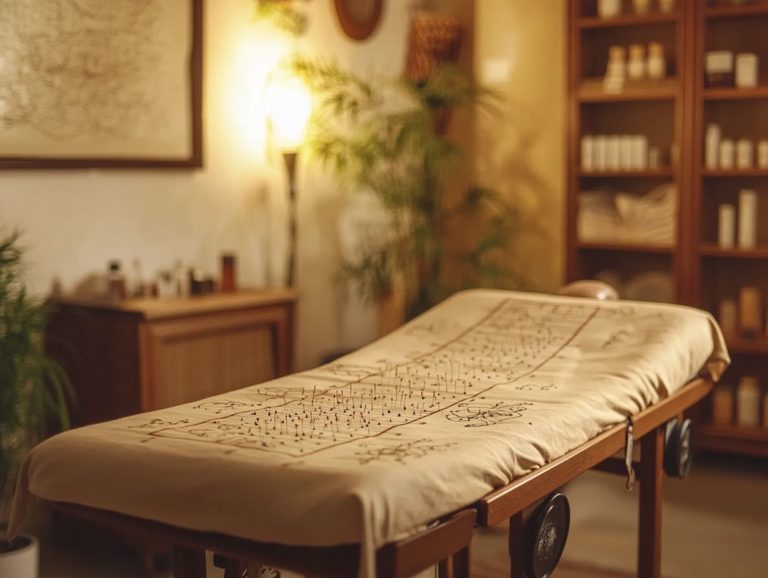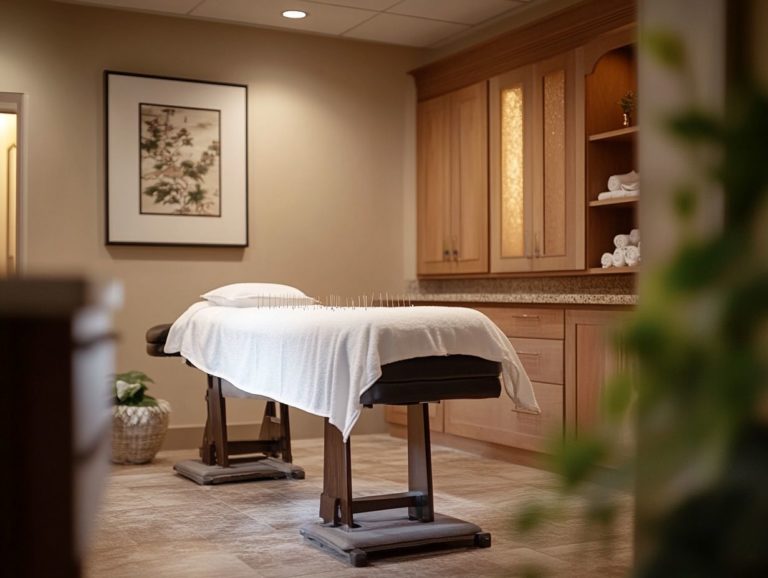How to Choose the Right Acupuncturist for You
Acupuncture has emerged as a sought-after approach to health, presenting a multitude of physical and mental benefits that can enhance your well-being.
However, delving into the world of acupuncture can feel daunting, especially when selecting the right practitioner for your needs.
This guide will empower you to understand what acupuncture involves, explore its extensive benefits, and offer practical insights for choosing an acupuncturist who aligns with your preferences.
From assessing qualifications to evaluating costs, this guide will arm you with the knowledge necessary to make an informed and confident decision.
Contents
- Key Takeaways:
- What is Acupuncture?
- Benefits of Acupuncture
- Factors to Consider When Choosing an Acupuncturist
- Questions to Ask When Meeting with an Acupuncturist
- Researching and Evaluating Acupuncturists
- Frequently Asked Questions
- What factors should I consider when choosing an acupuncturist?
- What are the credentials I should look for in an acupuncturist?
- Is experience important when choosing an acupuncturist?
- Should I choose an acupuncturist who specializes in my specific condition?
- How can I find a reputable acupuncturist?
- What questions should I ask during my initial consultation with an acupuncturist?
Key Takeaways:
- Choose an acupuncturist with the right qualifications and experience.
- Look for an acupuncturist whose location and schedule fit your needs.
- Research online reviews and ask questions about treatment plans.
What is Acupuncture?
Acupuncture, a key part of Traditional Chinese Medicine (TCM), involves gently putting in fine needles into specific points on your body to foster healing and restore balance.
This time-honored practice, refined over thousands of years, is celebrated for its effectiveness in addressing a wide array of health issues, from managing pain to reducing stress.
Licensed practitioners, typically certified by NCCAOM, skillfully use tailored acupuncture techniques that align with your health goals. They provide a comprehensive approach to wellness in a calming treatment room, offering flexible hours to suit your lifestyle.
Explanation of the Practice
Acupuncture techniques include various methods tailored to your needs, such as traditional needle insertion, moxibustion, cupping, and acupressure. Each practice stimulates specific acupuncture points to promote healing throughout your body.
Rooted in ancient Chinese medicine, these techniques work to restore your body s balance and encourage the flow of Qi, or vital energy. Each method has its unique benefits.
- Moxibustion uses heat from burning mugwort near acupuncture points to improve energy flow.
- Cupping uses suction to relieve muscle tension and improve blood circulation.
Practitioners undergo extensive clinical training, blending theoretical knowledge with hands-on experience. This ensures they are exceptionally equipped to deliver effective patient care. The historical significance of these practices adds depth to their modern applications, transforming acupuncture into a comprehensive approach to your overall wellness.
Benefits of Acupuncture
The benefits of acupuncture extend well beyond pain management. It provides a way to look at health as a whole, significantly enhancing both your physical and mental well-being.
Physical and Mental Health Benefits
Acupuncture has proven to be a powerful ally in enhancing physical health, effectively alleviating conditions like fibromyalgia, osteoarthritis, and myofascial pain.
It also offers substantial mental health benefits, such as reducing anxiety and improving mood. Recent studies emphasize the importance of specific acupuncture points like LI4 and ST36 in diminishing pain and boosting well-being.
For instance, a clinical trial involving individuals with fibromyalgia revealed that consistent acupuncture sessions led to significant reductions in pain intensity and anxiety levels, ultimately enhancing quality of life.
Participants also noted improvements in their sleep patterns and a brighter mood. This illustrates acupuncture’s holistic approach in addressing not only physical ailments but also the emotional hurdles that often accompany chronic pain.
This compelling evidence highlights the therapy’s versatility and effectiveness in managing complex health challenges.
Factors to Consider When Choosing an Acupuncturist

When selecting an acupuncturist, it s vital to consider these key factors:
- Look for their qualifications, particularly NCCAOM certification (National Certification Commission for Acupuncture and Oriental Medicine), which indicates extensive training.
- Consider their experience in the field.
- Consider whether they offer flexible hours to create a treatment environment that feels comfortable and conducive to your well-being.
Qualifications and Experience
A qualified acupuncturist should hold NCCAOM certification, signifying they have completed rigorous clinical training and possess the necessary skills to address a range of health concerns. This certification showcases their theoretical knowledge and emphasizes their hands-on experience in real-world clinical settings.
Moreover, practitioners must engage in ongoing education to keep abreast of the latest techniques and research in the field. Continuous learning cultivates a deeper understanding of how various therapies can be integrated into patient care, significantly enhancing treatment effectiveness.
Ultimately, an acupuncturist’s experience and commitment to lifelong learning directly influence patient outcomes. This ensures you receive tailored and informed care that truly meets your needs.
Location and Availability
The location of your treatment room and the availability of flexible hours are essential for making it easy to attend your sessions and integrate acupuncture into your health routine. Thoughtfully addressing these factors greatly enhances your access to services, whether visiting a private practice or a community acupuncture clinic.
A conveniently located practice in a bustling urban area is likely to attract a diverse clientele. Extended evening or weekend hours cater to those with packed schedules. This flexibility creates an inviting environment that encourages you to attend regularly and achieve your health goals!
Cost and Insurance Coverage
Understanding the costs of treatment packages and the details of your insurance coverage is crucial for making informed decisions about your acupuncture care. You may navigate a complex landscape of pricing models, which can vary significantly depending on the practitioner and your location.
It s essential to explore the various types of treatment packages available and determine if your health insurance offers reimbursement for these holistic services. By evaluating both the upfront costs associated with different acupuncture sessions and the potential insurance benefits, you can ease your financial concerns and focus on your well-being and healing journey.
Questions to Ask When Meeting with an Acupuncturist
During your free consultation, it s vital to inquire about the acupuncturist s treatment plans, the techniques they employ, and how their communication skills can elevate your patient-centered care experience.
Open dialogue is crucial for building a trusting relationship, so make sure you feel at ease discussing any specific concerns or conditions you wish to address.
Ask about their approach to personalized care, the anticipated duration and frequency of treatment sessions, and any potential side effects that might arise.
It s also wise to inquire about the practitioner s experience with cases similar to yours and their success rates. Gaining an understanding of their philosophy regarding holistic healing methods will provide valuable insight into how they might customize treatment to align effectively with your personal health goals.
Clarifying Treatment Plans and Techniques

It’s crucial for you to understand the treatment plans and techniques your acupuncturist employs. This understanding is especially important as they tailor personalized treatments to address your unique health concerns.
This journey often begins with an initial consultation where the practitioner evaluates both your physical symptoms and emotional well-being. They take a holistic view of your health history.
Depending on your preferences and specific ailments, various types of treatments may come into play, such as:
- Traditional needle acupuncture
- Acupressure
- Electrical stimulation
Each therapy can be finely adjusted to target areas like pain relief, stress management, or enhancing your overall wellness. Factors like your age, lifestyle, and any other medical treatments also matter to ensure that the techniques applied harmoniously align with your personal health journey.
Researching and Evaluating Acupuncturists
Researching and evaluating acupuncturists through online reviews and recommendations is essential. This process helps you discover a licensed practitioner who resonates with your treatment goals and values in community acupuncture settings.
Taking the time to assess these insights ensures that you find a practitioner committed to providing the quality of care you seek.
Online Reviews and Recommendations
Online reviews are full of valuable insights that reveal real patient experiences. They can help you gauge the quality of care available in both private practices and community acupuncture settings.
By diving into these reviews, you can identify patterns in how practitioners communicate, address concerns, and tailor treatments to individual needs. Often, feedback highlights essential aspects of a practitioner’s patient care approach, such as attentiveness, empathy, and treatment effectiveness.
As you sift through comments, look for observations that highlight a practitioner s willingness to listen to your needs and adjust treatment plans accordingly. It’s crucial to consider the context in which the reviews were written, as this can profoundly impact your interpretation of the feedback.
Ultimately, a critical reading of reviews enables you to make informed decisions about your acupuncture care. This ensures you choose a practitioner who aligns with your expectations and preferences.
Frequently Asked Questions
Got questions about acupuncture? Here are some common queries to guide you.
What factors should I consider when choosing an acupuncturist?
When choosing an acupuncturist, consider their credentials, experience, and specialization. You should also evaluate their location, availability, and cost.
What are the credentials I should look for in an acupuncturist?

An acupuncturist should be licensed by the state and have completed a Master’s or Doctoral degree in acupuncture. They should also be certified by the National Certification Commission for Acupuncture and Oriental Medicine (NCCAOM), an organization that sets standards for acupuncture practice.
Is experience important when choosing an acupuncturist?
Yes, experience is an important factor to consider. Look for someone who has been practicing for at least 3-5 years and has treated a variety of conditions similar to yours.
Should I choose an acupuncturist who specializes in my specific condition?
If you have a specific condition, it’s recommended to seek out an acupuncturist who has experience and expertise in treating that condition. This ensures that you receive the most effective treatment for your needs.
How can I find a reputable acupuncturist?
Ask friends or family for recommendations to find a reputable acupuncturist. Additionally, check online reviews and research their credentials and experience. You can also consult with your primary care physician for a referral.
What questions should I ask during my initial consultation with an acupuncturist?
During your initial consultation, ask about their treatment approach, the frequency and duration of treatments, and any potential side effects or risks. Inquire about their fees and insurance coverage, as well as their experience and success rates with treating your specific condition.






